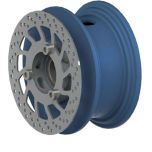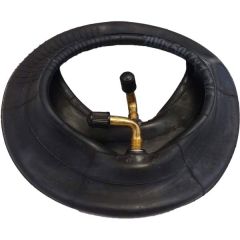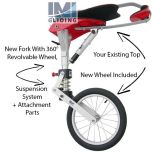TOST Brake Disks
TOST Brake Disk - Spare Part


General Description
TOST Brake Disks – Spare Parts - are made from heat–treated steel and turned from full material, so there is no welded joint between flange and disk. The perfect true running is a further advantage.
With our special heat treatment, the operating life is increased, and the optimum braking efficiency is achieved. The spot–grinding of the brake surface ensures a constant brake effect from the beginning and reduces the braking–in–period.
In addition to the standard brake disks available from stock, we also manufacture custom-made brake disks to your drawing or sample.
TOST Brake Disk price varies depending on selection.
Use above dropdown box for selections and final price.


3.5" Brake Disk
 |
For use with Mini and Max II Disk Brake Wheels |
|
P/N SKU |
∅ mm |
Height mm |
Thickness mm |
Application |
|
057310 6133 |
100 | - | 1.5 | 3.5′′ Max II disk brake wheel: p/n 053012, 053020 flat type Mini 150 disk brake wheel: p/n 051150 Mini 180 disk brake wheel: p/n 051180 |
|
057312 6134 |
134 | 20 | 3.5 | 3.5′′ Max II disk brake wheel: p/n 053030 Z-type for BZT M |
4" Brake Disks
 |
For use with Classic and Tria disk brake wheels (Z-type disk for use with brake assembly 30-9, BZT and BZT2): |
|
P/N SKU |
∅ mm |
Height mm |
Thickness mm | Application |
|
057011 6135 |
164 | 28 | 5 | 4" Classic disk brake wheel: p/n 054111 |
|
057031 6136 |
168315 | 4" Classic disk brake wheel: p/n 054111 | ||
|
057093 6144 |
192 | 36 | 6 | 4" Gnom disk brake wheel: p/n 054811, 054812 |
|
057420 6145 |
164 | 40 | 5 | 4" Tria disk brake wheel: p/n 054462, 054482 vented |
5" Brake Disks
 |
For use with Classic, Cleveland and Penta disk brake wheels (Z-type disk for use with brake assembly 30-9, BZT and BZT2): |
|
P/N SKU |
∅ mm |
Height mm |
Thickness mm |
Application |
|
057710 6112 |
162 | 52 | 5 | Cleveland wheel 40-78B: p/n 075100 |
|
057000 6146 |
166 | 22 | 5 | 5′′ Classic disk brake wheel: p/n 055145, 055151, 055152, 055153, 055155, 055156, 055158, 055188, 055191, 055192 |
|
057070 6100 |
180 | 42 | 5 | 5′′ Classic disk breake wheel: p/n 055161, 055162, 055171 |
|
057080 6156 |
180 | 52 | 8 | 5″ Penta disk brake wheel p/n 055532 |
|
057090 6147 |
170 | 35 | 5 | Retrofit to disk brake wheel Classic Twin Astir |
|
057220 6148 |
164 | 33 | 5 | 5′′ Penta disk brake wheel: p/n 055520 |
|
057230 6149 |
180 | 43 | 5 | 5′′ Penta disk brake wheel: p/n 055530 |
|
057236 6150 |
164 | 43 | 5 | 5′′ Penta disk brake wheel: p/n 055535, 055536 |
|
057238 6151 |
180 | 48 | 5 | 5′′ Penta disk brake wheel: p/n 055538 |
|
057244 6153 |
164 | 43 | 5 | 5′′ Penta disk brake wheel: p/n 055544 |
|
057272 6154 |
162 | 36.3 | 5 | 5′′ Penta disk brake wheel: p/n 055572 |
5" Brake Disk
 |
For use with Classic disk brake wheels, vented (Z-type disk for use with brake assembly 30-9, BZT and BZT2): |
|
P/N SKU |
∅ mm |
Height mm |
Thickness mm |
Application |
|
057001 6157 |
166 | 22 | 5 | 5′′ Classic disk brake wheel: p/n 055145, 055151, 055152, 055153, 055155, 055156, 055158, 055188, 055191, 055192 |
|
057071 6158 |
180 | 42 | 5 | 5′′ Classic disk brake wheel: p/n 055161, 055162, 055171 |
5" Brake Disk U-Type
 |
For use with TOG brake assembly with Classic and Penta disk brake wheels |
|
P/N SKU |
∅ mm |
Height mm |
Thickness mm |
Application |
|
057030 6167 |
160 | 42 | 4 | 5′′ Classic disk brake wheel: p/n 055110, 055120, 055130, 055135, 055140 |
|
057040 6168 |
160 | 53 | 4 | 5′′ Penta disk brake wheel: p/n 055560 |
5" Disk Brake Step-Type
 |
For mounting on Classic disk brake wheels as well as for retrofitting of shoe brake wheel Standard |
|
P/N SKU |
∅ mm |
Height mm |
Thickness mm |
Application |
|
057513 6159 |
164 | 50.5 | 5 | 5′′ Classic disk brake wheel: p/n 055213 |
|
057512 6160 |
164 | 55 | 5 | 5′′ Classic disk brake wheel: p/n 055212 |
|
057509 6161 |
164 | 45.5 | 5 | Retrofit 5′′ Standard shoe brake wheel to 5′′ Classic disk brake wheel, for Astir CS, Jeans Astir, SF-34, Kiwi, Mosquito |
|
057510 6162 |
180 | 48 | 5 | Retrofit 5′′ Standard shoe brake wheel to 5′′ Classic disk brake wheel, for ASK13 |
|
057511 |
180 | 52 | 5 | 5′′ Classic disk brake wheel: p/n 055211 |
|
057815 6163 |
185 | 56 | 6.5 | for Speed Canard |
|
057520 6164 |
198 | 39 | 5 | for DR 300 and DR 400 |
6" Brake Disk
 |
For use with Classic, Cleveland and Penta disk brake wheels (Z-type disk for use with brake assembly 30-9, 30-63A and BZT2): |
|
P/N SKU |
∅ mm |
Height mm |
Thickness mm |
Application |
|
057075 6173 |
184 | 25 | 5 | 6′′ Classic Classic disk brake wheel: p/n 056131 |
|
057091 6175 |
184 | 44 | 6 | 6′′ Classic Classic disk brake wheel: p/n 056161 (Fournier RF-5) |
|
057095 6176 |
192 | 52 | 6 | 6′′ Classic Classic disk brake wheel: p/n 056650 (Ruschmeyer R90) |
|
057098 6180 |
190 | 50 | 7 | 6′′ SBL: p/n 056990 |
|
057720 6179 |
190.5 | 54 | 6 | Cleveland-wheel 40-97A: p/n 076100 |
|
057260 6172 |
180 | 35 | 5 | 6′′ Penta disk brake wheel: p/n 057260 |
6" Brake Disk
 |
For use with UL Penta disk brake wheels (flat-type for brake assembly BZ-UL): |
|
P/N SKU |
∅ mm |
Height mm |
Thickness mm |
Application |
|
057316 6182 |
185 | - | 2 | 6′′ UL-Penta disk brake wheel: p/n 056820 |
For many years disk brake wheels (SB) have been the first choice as a braked wheel for gliders, motor gliders, Ultralight aircraft, powered aircraft as well as for helicopters and gyrocopters. Due to the facts that the brake force can be well-applied, the automatic re-adjustment of the lining abrasion and the high, stable braking power, disk brake wheels provide an ideal braking efficiency in all situations and ensure the safe realization of a flight.
Remark to the tables:
The indication of the mass of a wheel includes the wheel hub with ball bearings and brake disk. You can find the mass of the tires/tubes and brake assemblies in the correspondent chapters of the catalog.
Pay attention to the following points to ensure the operational function of the brake system in your aircraft:
- The min. thickness of the brake disk may not be underrun, see page 29 of the TOST Catalog
- The minimum thickness of the brake lining may not be underrun, see page 50 of the TOST Catalog
- Watch out for sealings and boltings so that no leakage may occur
- Change the brake fluid regularly
- Never mix brake fluid DOT 4 and Mineral Fluid
- The brake system should be well-bled
Maintenance notes for brake disk
- Inspect brake disk for cracks, excessive wear and tear, grooves, corrosion and deformation.
- Remove corrosion and smooth smaller nicks with fine emery paper (400 grain).
- Replace the brake disk, if it is worn beyond the wear limit (see below).
Measure this minimum at two or three spots. - Replace the brake disk if it has an axial throw of 0.2 mm.
- Brake disks are surface-treated only for special applications. A rust film of varying degree may form on the brake disk. That can be removed with one or two parking brake operations.
- If rust has progressed further, it may be necessary to dismantle the disk from thewheel so that both disk surfaces can be cleaned properly. First use a steel brush, then follow with 220 grain emery paper. Finally polish with 400 grain emery paper. This procedure may allow you to continue using the brake disk.
| Disk Thickness mm | Wear Limit mm |
| 1.5 | 1.3 |
| 2.0 | 1.7 |
| 4.0 | 3.3 |
| 5.0 | 4.3 |
| 6.0 | 5.2 |
| 6.5 | 5.5 |
| 8.0 | 7.0 |
Notes to aircraft tires
Tire exchange
Removal:
- Jack up aircraft at specified point.
- Deflate tire completely before removing wheel unit.
- Do not unscrew the valve insert until the tire pressure has dropped to 0.2 bar.
- Remove wheel from axle.
- Loosen wheel bead from the hub shoulder with a rubber or plastic hammer.
- Undo wheel bolts (with 5 mm hexagon key), remove bolts and washers, split hub halves.
Mounting:
- Tires and wheel hubs must be clean and dry.
- Do not apply excessive force when replacing a wheel.
- Apply adhesive agent (or talcum powder) to the hub shoulder.
- Remove dirt, sand, labels, etc. from the tire. Apply a moderate amount of talcum powder to reduce friction between tube and tire. Caution: Too much talcum has the opposite effect.
- Fill air into tube (placed in the tire) until it is evenly round. Remove nut and washer from valve.
- Place tire (red mark at valve hole) and tube on the wheel half with the valve hole, push valve through valve hole
- Push other wheel half onto tire, match bolt holes with centering shaft.
- Insert wheel bolts, washers and any nuts, and tighten to the correct torque (M6: 9 to 10 Nm). Tighten bolts diagonally.
- Place a tire in a safety cage when inflating it to mounting pressure for the first time. If you do not have a safety cage, take great care when inflating the tire. Inflate the tire to mounting pressure. The mounting pressure is 10% more than the specified operating pressure. Check carefully for leaks. Leave to adjust at this pressure for 12 to 24 hours. Once the tire shows no leaks and is at operating pressure, the wheel unit can be mounted on the aircraft.
- Make sure that the wheel unit is mounted perfectly balanced to avoid vibration and excessive wear.
Red Dot:
Larger aircraft tires are marked with a red dot. This is an indication of the lightest spot of the tire. The valve must be placed at this point to eliminate or minimize a balance/vibration problem of the tire.
WARNING:
An inflated tire is a potentially explosive device – treat it with the correct equipment and precautions!
Notes on inner tubes
Aircraft tubes are made from natural rubber, and they are slightly underdimensioned so that it is easier to install them in a new tire. The layers of an aircraft tire are made of nylon – they therefore tend to become larger with use.
The inner tube also increases in size, adapting to the larger inside diameter of the tire. If a tube enlarged in this way is later fitted in a new tire, it can happen that it is too big for the inside of the tire, with the result that the tube may crease.
These creases may rub through during operation, causing the tube to lose pressure. Rubbing through slowly results in slow pressure loss – the pilot is thus warned before a dangerous situation arises. If the tube tears during a start, the pilot will fail
to notice that he is flying with a flat tire.
Taking into consideration all the risks involved with fitting an old tube into a new tire, it is advisable always to fit new inner tubes in new tires.
Tire maintenance instructions
- Maintain stipulated air pressure, check at regular intervals! Underpressure results in reduced load capacity and shortens service life.
- Inspect tires at regular intervals for damages, shredding, flat areas and foreign objects.
- Wheel units must be mounted perfectly balanced. Wheel imbalance can result in damage to bearings and brake drums.
- Keep tires free of oil, grease, brake fluid and tar. Clean tires with rag soaked with petrol, then wash off with soap and water.
TOST Brake Disks – Spare Parts is a special order item. Please allow approximately four weeks for delivery.
Always use TOST Tires and Tubes when available.
See "Tech Data" tab for Description, Application and Technical Data.
Select the right Tire, Tube & Wheel for your sailplane by referencing our: Tire, Tube & Wheel Selection Guide.






























